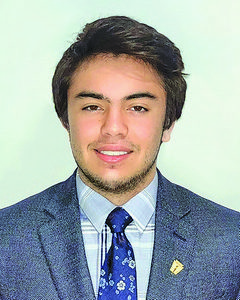|
Getting your Trinity Audio player ready...
|

Gulliver Prep senior Joao Carvalho is a National Merit Scholarship Semi-Finalist and a Hispanic Scholarship Fund Scholar. He also won the MIT Book Award as a junior.
For several years, Carvalho has been developing and teaching STEM classes for Breakthrough Miami Scholars as part of the group Together We Innovate.
With Zeta Omicron, the computer science honor society, he goes to Homestead to work with students at the Title IX Migrant Education Center to teach computer science and engineering. They go to the CARE center in Overtown as well.
Additionally, he started a project to address the growing levels of Sargassum seaweed in the Atlantic. It’s so bad, Miami-Dade County spends $350,000 a month to remove the stinky seaweed.
“A report from the county’s Parks Department estimated that the daily cleanup of the entirety of Miami Beach would cost about $45 million dollars a year,” he says. “Initially, most of the collected Sargassum was dumped in landfills.”
What others see as waste, he sees it as an opportunity. He formed a team called Innovation for Tomorrow and recruited students from local high schools to help solve the problem. They hope to use the algae to make plastic.
“IFT seeks to use bacterial fermentation to derive lactic acid from the unwanted Sargassum and then polymerize that lactic acid to create polylactic acid, an industrially biodegradable bioplastic” he says. They are in the early research phase of the process. He says they hope to have a deliverable product by spring.
At Gulliver, Carvalho is involved in Robotics on Team 5557 – The BB-R8ERS, the Photography Club, the National Honor Society, Mu Alpha Theta, Rho Kappa, Zeta Omicron and he is the inaugural president of the Science National Honor Society.
Last May, Carvalho and some of his friends drove to the Space Coast to see the first Space X manned launch. On the way there, he learned about the Kausay Wasu Clinic in Coya, Peru that needed computers for students who were receiving instruction from the radio instead of on-line. He called his computer teacher, who receives used computers for their Recycle Refurbish program. He teamed up with Jade Pita to send over Chromebooks and other computers to the clinic, that was being set up as a hub for online learning.
“My responsibility was to refurbish the donated computers, install the appropriate operating systems and ensure all parts were in order,” he says. The plan is to continue to send laptops and tablets to the clinic.
Carvalho spent spring break watching tutorials on using python, a programming language.
He used that knowledge to write a script that took information from Johns Hopkins on the number of COVID cases in Miami-Dade and he shared the information on social media and an email list.
He’s also working on an app that will make local voting easier by helping citizens figure out the issues and the candidates running for office. The app, called Informed, helps citizens to track elections, candidates and key issues. The app is being entered in the Congressional App Challenge.
Among his other accomplishments is his internship with Embry Riddle.
“The internship at Embry Riddle was with Project Lead the Way, PLTW, a leader in STEM education,” he says. “It was a professional development session for engineering teachers and I was brought on along with other students to help model the design and rapid prototyping process. With a group of four other students, I ran a design SPRINT and created a prototype for a device that could harness mechanical energy to charge a battery and power a circuit.”
Linda Rodriguez Bernfeld





